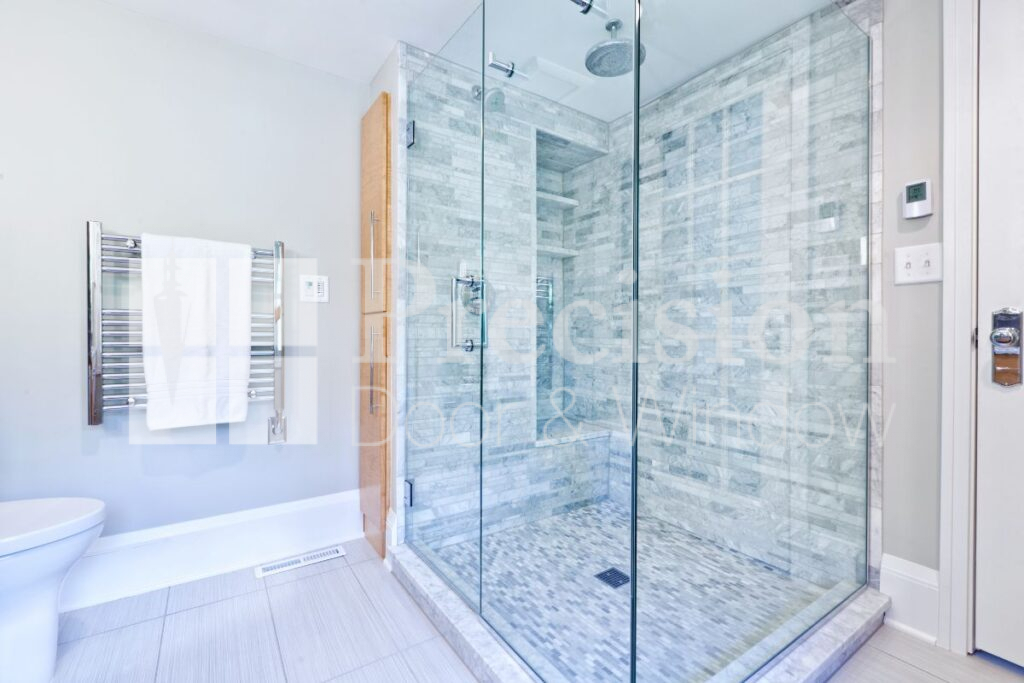Are you planning to change the look of your bathroom space with a new glass shower door? Then this guide is for you! This article will help you make the right decision about glass shower door thickness.
Why Is It Important To Choose The Right Thickness For A Glass Shower Door?
When you’re shopping for a new shower door, you’ll notice that the thickness of frameless glass shower doors and other styles vary quite a bit.
The average thickness of shower door glass generally ranges from 3/16 of an inch to a 1/2 inch. But what does this really mean for your bathroom?
Just like your home’s foundation needs to be strong enough to support your house, your shower door needs to be thick enough to stand up to daily use.
It’s important to get the correct thickness for your door in order to make sure that it will be stable, safe, and beautiful for years to come.
What Are The Different Glass Thickness Options That You’ll Come Across?
As we mentioned before, glass door options are available in a variety of thicknesses, with some being better suited for different types of glass doors. Here are some of the options you will find:
3/16-Inch Glass
If you’re working with a tighter budget or planning to install a framed shower door, glass that is 3/16 inches thick might be perfect for your needs.
This glass thickness is best suited for framed doors. The frame provides extra support, making up for the thinner glass. Many California homeowners choose this option for guest bathrooms or smaller shower spaces where heavy-duty glass isn’t necessary.
1/4-Inch Glass
Perhaps one of the most common options, ¼-inch glass offers an excellent balance of durability and cost. This thickness of glass for shower doors works beautifully in both framed and semi-frameless designs.
It’s sturdy enough to provide good protection while remaining light enough to operate smoothly. Many of our customers find this thickness is effective in terms of both quality and budget.
3/8-Inch Glass
When you’re looking at frameless shower doors, this is the perfect thickness for most. The thickness of frameless glass shower doors needs to be substantial enough to stand on its own, and ⅜-inch glass delivers exactly that.
It provides the modern and great look that many California homeowners really like while offering excellent stability and durability.
1/2-Inch Glass
For those who are looking for both a premium feel and enhanced durability, ½-inch glass is the way to go. This shower glass option can be particularly seen in high-end California homes with spacious bathrooms.
While it’s the most expensive option, it offers very nice stability and an impressive substantial feel.
How To Choose The Right Thickness For Your Shower Glass Door

Now that you’re aware of the different thickness options for glass doors on the market, you might get confused about what to choose for your bathroom space.
Here are some important considerations that will help you make the right choice for your glass door.
#1 Your Design Vision
👉 Frameless designs generally need thicker glass (⅜-inch or ½-inch)
👉 Framed designs work well for thinner glass (3/16-inch or ¼-inch)
👉 Semi-frameless options usually work best with ¼-inch or ⅜-inch glass
#2 Your Space
👉 Larger shower enclosures often benefit from thicker glass for added stability
👉 Smaller spaces might work perfectly well with thinner options
👉 Consider the weight your bathroom structure can support
#3 Your Budget
👉 Remember that thicker glass will increase your investment
👉 Factor in long-term durability when making your decision
👉 Consider the value added to your home
Check The Safety Standards Of The Glass And Follow Simple Maintenance Practices
No matter which thickness you choose, all shower doors made of glass need to meet strict safety standards. Each option is tempered for your protection, meaning it’s designed to break into small, rounded pieces rather than sharp shards if damage occurs.
However, thicker glass generally provides an extra measure of security and stability that many homeowners appreciate.
For maintenance, you’ll find that all glass thickness options are equally easy to clean. The main difference lies in the door’s weight, since thicker glass doors might require a bit more effort to open and close, but often feel more substantial and luxurious.
Also Read: How long does a glass shower last?
Call Precision Door & Window For Professional Frameless Shower Enclosures In Temecula, CA
As your local professionals, we understand that inviting someone into your home for installations requires complete trust, and that’s exactly what we’ve built our reputation on.
At Precision Door & Window, we’re a team of experienced professionals who take genuine pride in transforming bathrooms across Temecula, and the surrounding communities. When you choose us for your frameless shower enclosure, you’re not just getting quality materials and precise installation, you’re partnering with neighbors who care about getting every detail right for your home.
What sets us apart is our personalized approach. We’ll take the time to understand your vision, guide you through material and style options, and ensure the final result exceeds your expectations. From the initial consultation to the final inspection, we’re here to make the process smooth and stress-free.
To improve the feel of your bathroom with a beautiful frameless shower enclosure in Temecula, CA, give us a call at (951) 595-0126 for a free, no-pressure consultation. We’re here to help you make the best choice for your home.
A. Thicker glass can provide a slight improvement in soundproofing, reducing noise transmission between the bathroom and adjacent rooms. However, for significant soundproofing, additional measures like soundproofing insulation or thicker walls may be necessary.
A. Hard water can leave mineral deposits on the glass, making it more prone to etching and clouding over time. While thicker glass may be more durable, it’s still susceptible to water damage. Use water softeners or regularly clean the glass to help mitigate this issue.
A. Thicker glass generally costs more than thinner glass. The additional cost is due to the increased material and labor involved in manufacturing and installing thicker glass.

